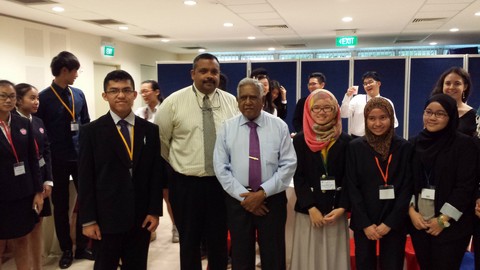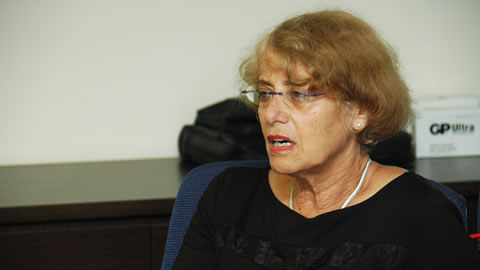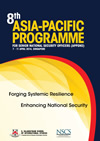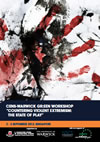| Seminar@CENS |
Seminars by Professor Erik Gartzke,
Professor of Political Science at the University of California, San Diego , USA
"No Humans Were Harmed in the Making of this War:
The Nature and Consequences of 'Costless' Combat", 11pm, 7 Jul 2014
"Strategy in an Era of Complexity: An Outline of the Cross-Domain Deterrence Project", 1pm, 7 Jul 2014

|
|
 |
| Recommended Reading by CENS |
|
6th International Conference on Cyber Conflict
Caitríona Heinl's (Research Fellow) contribution in this book discusses the implications of employing artificial (intelligent) agents for active cyber defence measures, in other words proactive measures in the context of military and private sector operations. It finds several technical and policy-related questions still surround the possible future consequences of these tools, in particular for the use of fully autonomous intelligent agents, emerging techniques and possible disruptive technologies that combine AI with other disciplines.
|
|
 |
| CENS News |
|
6th International Conference on Cyber Conflict
Tallinn, Estonia, 3-6 Jun 2014
The NATO Cooperative Cyber Defence Centre of Excellence (NATO CCD COE) brought over 450 experts together from 35 countries to discuss "Active Cyber Defence" for four days at is annual international conference on cyber conflict - CyCon 2014. The risks and benefits as well as the technical, strategic, and legal implications of applying active cyber defence were discussed by participants and speakers.
H.E. President Ilves of the Republic of Estonia gave the opening address and Dr. Jamie Shea, NATO Deputy Assistant Secretary General for Emerging Security Challenges discussed NATO's future challenges in cyber defence. This conference aimed to analyse the issues, models and solutions of active cyber defence from a multi-disciplinary perspective. The papers discussed were spread across the legal, policy, strategic and technical disciplines. Caitríona Heinl (Research Fellow) was invited to present on "Artificial (Intelligent) Agents and Active Cyber Defence: Policy Implications". She was also invited to participate in a panel moderated by Rain Ottis on "The Use of Active Cyber Defence: Concepts, Policy and Strategy Aspects" with Irving Lachow, David Dittrich, Robert Dewar, and Jason Rivera.
|
|
 |
| CENS in the News |
|
There’s an app for that
Human traffickers go mobile
Anne Summers Reports, Jun 2014
With the explosion of internet users
among Southeast Asia’s 600 million
people, human traffickers now exploit
social media, mobile phones and other
online technologies to conduct their
evil trade. But, as Alistair D. B. Cook
& Caitríona H. Heinl (Research Fellow) report, the fight
against them is also going online.
» click here to read the article
|
|
 |
| CENS Publication |
|
Lim Chin Siong and that Beauty World Speech: A Closer Look
IPS Commons, 4 Jun 2014
Writing for the IPS Commons online forum, Kumar Ramakrishna (Head) pointed out that few historical figures in Singapore’s post-war history excite as much controversy as does Lim Chin Siong (1933-96). Emerging from a humble background, Lim quickly rose in the 1950s to become an exceptional trade union leader and organiser. He joined the People’s Action Party (PAP) as a founder member in 1954, and won a seat in the Legislative Assembly the following year as a PAP candidate. He proved himself an absolutely first-rate Chinese-language orator, able to move large crowds with his folksy anti-colonial speeches.
» click here to read the article
|
|
 |
| CENS Outreach |
Opening Ceremony of the Model ASEAN Plus Summit at Dunman High School.
4 Jun 2014
Kumar Ramakrishna (Head), Damien D. Cheong (Research Fellow) and Eliane Coates (Senior Analyst) attended the Opening Ceremony of the Model ASEAN Plus (DHAP) Summit 2014 at Dunman High School on 04 June 2014. The theme for DHAP 2014 was ‘Charting Courses’. The theme highlights the myriad of paths ASEAN can take to navigate the increasingly unexpected global and regional challenges. DHAP aims to provide participating students an opportunity to learn about ASEAN, its history, structures and processes, and to prepare them to participate as active members of the ASEAN Community. Guest of Honour, former President S. R. Nathan presented the keynote address, followed by a panel discussion with former President S.R. Nathan and Kumar Ramakrishna, and question and answer session with the delegates.

|
|
 |
| Recommended Reading by CENS |
|
Stable States: Rethinking social cohesion and good governance
Damien D. Cheong's (Research Fellow) contribution in this book discusses measures that can be employed by security officials to engage communities in order to enhance social cohesion. This is important particularly in countries where social, ethnic and/or religious cleavages exist, and where trust in the security apparatus from a particular community is lacking.
» click here to read the book
|
|
 |
| CENS in the News |
|
It’s about politics, not faith
The New Paper, 22 May 2014
Commenting on the Syrian conflict. Kumar Ramakrishna (Head) said it was due to religious extremist ideologues. They argue that the Syrian conflict is the start of the end-times, the apocalyptic struggle between the forces of good and evil. Defeating the Assad regime is seen as victory for Islam, so “It is a political message couched in religious terms - and it could have potent emotional appeal.”
» click here to read the article
|
|
 |
| CENS in the News |
|
Beef up security for major sports events
The Straits Times, 17 May 2014
Sulastri Osman (Research Fellow) and Joseph Franco (Associate Research Fellows) highlighted the double-edged sword of Singapore’s aspiration to be a key centre for international sporting events such as the SEA swimming championships. Highlighting the recent trend of terrorism targeting sporting events, the writers explained that the potent reason behind the choice of such events by terrorists is the availability of a captive audience for their violent spectacle. Moving forward in establishing Singapore as a popular sporting venue, it was recommended that the nation balance security with preparedness through risk mitigation by subtly incorporating physical infrastructure security during the design process of new venues and facilities.
» click here to read the article
|
|
 |
| CENS in the News |
|
Bishan SMRT depot vandalism may have wider security implications, say observers
Channel NewsAsia, 12 May 2014
More must be done to strengthen security at Singapore's key installations, said observers following the recent case of vandalism at Bishan SMRT depot that may have wider security implications. Kumar Ramakrishna (Head) said hypothetically, if they find out that the person is responsible is indeed from within, then that certainly calls for more stringent background checks. One of the potential scenarios from a homeland security point of view is that of self-radicalised individuals, which cannot be entirely ruled out.
» click here to read the article
|
|
 |
| CENS in the News |
|
Indonesia’s Next President: Will Jokowi Prevail?
The Nation (Thailand), 6 May 2014
Bilveer Singh (Adjunct Senior Fellow) commented that Indonesia's parliamentary elections on April 9 were significant in fortifying its democracy but they produced unexpected results that belied poll predictions. While forecasters were correct in predicting that the leading parties were likely to be the Indonesian Democratic Party of Struggle (PDIP), Golkar and Gerindra, they were way off in respect of the margins of victory.
» click here to read the article
|
|
 |
| CENS News |
|
World Continuity Congress Singapore 2014
Singapore, 22 Apr 2014
Kumar Ramakrishna (Head) was invited by World Continuity Congress Singapore to present on "The Threat of Transnational Terrorism to Singapore and Southeast Asia: Implications for Business Resilience".
|
|
|
 |
| CENS in the News |
|
For community spirit to thrive, the Ugly Singaporean must go
Commentary by Damien D. Cheong
TODAY, 18 Apr 2014
Singaporeans have been asked to reflect on their behaviour and attitude toward their fellow human beings once again. Being gracious and considerate, as the author argues, is not simply about being pleasant as an individual, but such a disposition enhances national cohesiveness as well.
» click here to read the article
This commentary also re-published in The Malaysian Insider as "The Ugly Singaporean must go" on 21 Apr 2014
|
|
 |
| CENS in the News |
|
Beware of ‘lone wolf’ terrorists
The Sun Daily (Malaysia), 15 Apr 2014
Terrorism is mutating and constantly evolving in this age and time, says Kumar Ramakrishna (Head). He noted that there are terrorist cells which do not recruit people, but are self-radicalised individuals who (adopt) the ideas of the terrorist groups and carry out their plans. "There is a rise in 'lone wolves', where these self-radicalised individuals log on to YouTube and the internet and view information about these terrorist groups," Dr Kumar said at the ‘Putrajaya Forum 2014: Defence and Security Forum for Peace’ at the Putra World Trade Centre.
» click here to read the article
|
|
 |
| CENS Publication |
|
Jihadists in Syria: Indonesian Extremists Giving Support?
Eurasia Review, 10 Apr 2014
Navhat Nuraniyah (Associate Research Fellow) commented that the emergence of overt supporters of the Islamic State of Iraq and Sham (ISIS) in Indonesia has raised concerns regarding links between local and global jihadi groups. This overt support does not necessarily mean ISIS may take root in Indonesia.
» click here to read the article
|
|
 |
| Seminar@CENS |
| Seminar Series by Professor Steve Flynn, CENS Distinguished Visiting Fellow
"Mastering Crisis Communications in the Fast-Moving Social Media Age: Lessons Learned for Practitioners", 9 Apr 2014
"Balancing Security and Liberty in a Wikileaks Age: Some Personal Reflections", 14 Apr 2014
"Community Resilience in a Disaster: What it Looks Like, How to Promote It", 16 Apr 2014
» click here for the summary
|
|
 |
| CENS in the News |
|
Terror threats: Private sector, public 'must play their part'
The Straits Times, page B2, 8 Apr 2014
When dealing with the threats of today - such as terrorism, cyber warfare and epidemics - government efforts alone are not enough, Second Minister for Home Affairs and Trade and Industry S. Iswaran said yesterday. The private sector and general public must play their part, he added, while governments also need to talk to one another. Speaking at the opening of the eighth annual Asia-Pacific Programme for Senior National Security Officers (APPSNO) yesterday, Mr Iswaran said today's threats have three things in common - they cross borders, can develop quickly, and are difficult to resolve. Mr Barry Desker, dean of RSIS which is organising the five-day event, called for "a mindset shift" and an acknowledgment by stakeholders that today's complicated threats cannot be eliminated totally, but "managed and maintained at acceptable levels". More than 80 senior national security practitioners, policymakers and academics from 26 countries will exchange ideas through panels and lectures.
|
|
 |
| CENS in the News |
|
‘Iswaran: government and people should work together for national security’
Lianhe Zaobao, page 5, 8 Apr 2014
When dealing with the threats of today - such as terrorism, cyber warfare and epidemics - government efforts alone are not enough, Second Minister for Home Affairs and Trade and Industry S. Iswaran said yesterday, at the eighth annual Asia-Pacific Programme for Senior National Security Officers (APPSNO) organised by NTU’s RSIS. Barry Desker, dean of RSIS called for “a mindset shift” and an acknowledgment by stakeholders that today's complicated threats cannot be eliminated totally, but "managed and maintained at acceptable levels".
|
|
 |
| Asia-Pacific Programme for Senior National Security Officers (APPSNO) |
|
The Challenge of Systemic Resilience for National Security
Date: 7 - 11 April 2014
In recent years the strategic concept of resilience has become increasingly central to our understanding of homeland and national security issues. But how can this potentially rich concept be operationalized in practical terms for policy purposes?
Leading governance and security experts in homeland security matters from around the world will be invited to share their experiences and address the following broad topics:
1. Various national approaches to "systemic resilience".
2. Applying the systemic resilience concept to key national and homeland security issues particular to the Asia Pacific region and beyond, such as for instance countering violent extremism, coping with rapid technological changes, as well as government and community preparedness and response in national emergencies.
3. Case studies of best practices, strategies and lessons learned in dealing with various homeland security issues from a systems-based resilience perspective. |
|
 |
| CENS in the News |
|
Changi Airport’s security measures enhanced following MH370's disappearance
Channel NewsAsia, 24 Mar 2014
Following the recent disappearance of Malaysia Airlines MH370, security has been further raised at Singapore's Changi Airport as a precautionary measure. In 2013, some 53.7 million passengers passed through Changi Airport -- that is about 147,000 passengers each day. Not only that, more than 6,900 flights either landed at or departed from Changi Airport that year. Kumar Ramakrishna (head) said airport security is something that simply cannot be taken for granted. The challenge is always to ensure a balance between security and efficiency. It's not just about security, security is paramount, but at the same time because Singapore and other countries are part of the global economy, the relative efficient flow of passengers is also very important.
» click here to read the article
|
|
 |
| CENS in the News |
|
Cyber Security
Channel NewsAsia, 11 Mar 2014
Damien D. Cheong (Research Fellow) was a discussant on a recent episode of SG+ in which he discussed cybersecurity in Singapore. 11 March 2014
» click here to view the episode
|
|
 |
| CENS in the News |
|
Singapore and the MH370 Saga: A Friend in Need
Lianhe Zaobao, 24 Mar 2014
Bilveer Singh (Adjunct Senior Fellow) mentioned that if and when the MH370 saga is resolved, the consequences and knock-on effects will reverberate not just through the aviation industry but also the political, military and diplomatic domains. He also commented that being a proximate neighbour of Malaysia with a complex web of close relationships, Singapore could not avoid the ripple-effects of the episode; even though there were no Singaporeans on the missing aircraft, Singapore’s involvement in the search for MH370 stood out in a number of ways.
|
|
 |
| Seminar@CENS |
Seminar by Professor Edna Erez, Professor of Criminology, Law, and Justice, University of Illinois, Chicago, USA
"Palestinian women in terrorism: a cost benefit analysis", 21 Mar 2014
» click here for the summary

|
|
 |
| CENS in the News |
|
Days of Rage - Episode 4: Laju Hijack
Channel NewsAsia, 10 Mar 2014
Damien D. Cheong (Research Fellow) was featured in Episode 4 of the CNA documentary series “Days of Rage: Laju Hijacking”. He talked about some of the issues relating to terrorist group collaboration in the 1970s.
» click here to view the episode
|
|
 |
| CENS in the News |
|
Malaysia airport security spotlighted over missing plane
Channel NewsAsia, 10 Mar 2014
Kumar Ramakrishna (Head) commented that it may not be fair to finger the whole system in place there (at Kuala Lumpur International Airport). The key thing is that countries should make it a point to be electronically linked to the Interpol database -- as an added and important layer in the range of border controls to detect false travel documentation used by drug mules or terrorists."
» click here to read the article
|
|
 |
|
 |
| CENS Publication |
|
Syrian Conflict Fallout: Time to Contain Hate Speech in Indonesia
Jakarta Post, 1 Mar 2014
Navhat Nuraniyah (Associate Research Fellow) commented that Jihadi groups propagate an anti-Shia narrative to mobilise Indonesian militants to fight in Syria. This has spread the seeds of sectarian conflict in Indonesia which could have wider repercussions.
|
|
 |
| CENS Publication |
|
Peace in Mindanao: The Challenge of Disarming Rebels
Eurasia Review, 27 Feb 2014
Joseph Franco (Associate Research Fellow) commented that a military offensive against the Bangsamoro Islamic Freedom Fighters (BIFF) reduced the threat of “spoilers” to rekindle violence. However, failing to reintegrate BIFF communities can lead to the emergence of a new generation of violent militants, posing a threat to the wider region.
» click here to read the article
|
|
 |
| CENS Publication |
|
Revising the revisionists: Operation Coldstore in history
IPS Commons, 20 Feb 2014
Writing for the IPS Commons online forum, Kumar Ramakrishna (Head) argues that the recent controversy over the naming of the Indonesian navy vessel after two Indonesian marines convicted of the March 1965 MacDonald House bombing, suggests that the current Singaporean zeitgeist is receptive to revisionist and not always accurate reassessments of our history. He examines one such defining historical episode Operation Coldstore, showing that recent revisionist retellings are flawed.
» click here to read the article
|
|
 |
| Seminar@CENS |
Seminar by Dr Justin Hastings, Senior Lecturer, University of Sydney
"Threats from the Periphery: The Ambiguous Political Economy of Security in Southeast Asia’s Borderlands", 12 Feb 2014
» click here for the summary

|
|
 |
| CENS Publication |
|
Enhancing Cybersecurity: Improving
Technical and Analytical Expertise
Eurasia Review, 5 Feb 2014
Damien D. Cheong (Research Fellow) pointed out that Singapore’s recent initiatives to increase cybersecurity expertise through specialist training and education are timely and necessary. In addition to enhancing such skills, the strategic analytical skills of existing and potential cybersecurity practitioners must be honed as well.
» click here to read the article
|
|
 |
| CENS in the News |
|
Battling cosmic wars in the minds of terrorists
The Straits Times, 31 Jan 2014
This story is a feature on the work done by religious extremism export Professor Mark Juergensmeyer who was in Singapore recently as a CENS Distinguished Visiting Fellow at a seminar on religious extremism and violence, organised by the Centre of Excellence for National Security (CENS). Kumar Ramakrishna (Head) was also quoted in the story saying that religious extremist leaders like Myanmar's Wirathu and Indonesia's Abu Bakar Bashir exploit nationalist sentiments to get their followers to commit violent acts.
» click here to read the article
|
|
 |
| CENS in the News |
|
Don't fall for a terrorist's bait
The Straits Times, 31 Jan 2014
What happened on Sept 11, 2001, when Al-Qaeda suicide terrorists crashed aircraft into New York's World Trade Centre, was tragic.
But the United States' response the following day created a new set of problems, says Professor Mark Juergensmeyer (CENS Distinguished Visiting Fellow), an expert on religious violence.
That was the day the US described the attack as "an act of war".
"It bit the bait Osama bin Laden had laid for the US. I thought to myself, 'Why on earth are we promoting the ideology of Osama bin Laden?'.
"By going for the military solution, we validated bin Laden's view with our own rhetoric and actions," he says.
» click here to read the article
|
|
 |
| CENS Publication |
|
Countering The Self-Radicalised Lone Wolf: A New Paradigm?
Eurasia Review, 28 Jan 2014
Kumar Ramakrishna (Head) noted that Internet-driven self-radicalisation of the lone wolf is an increasing cause of concern for governments and societies everywhere. A new paradigm for countering self-radicalisation is suggested, comprising the five dimensions of Sender, Message, Recipient, Mechanism and Context.
» click here to read the article
|
|
 |
| CENS in the News |
|
Defusing Terror Threats from Sheik Google
The Straits Times, 24 Jan 2014
Kumar Ramakrishna (Head) says that with the spread of Al-Qaeda ideology via the Internet, "the threat of terrorism has metastasised".
"Some military strategists even talk of so-called Fifth Generation Warfare in which 'super-empowered' lone wolves may in the coming decade exploit digital technology to mount crippling cyber attacks on national infrastructure. They may even deploy small radiological devices against cities," he says.
It is important to have effective counter-ideological campaigns aimed at undermining the violent extremist ideology that sustains them, he adds.
» click here to read the article
|
|
 |
| Seminar@CENS |
| Seminar Series by Professor Mark Juergensmeyer, CENS Distinguished Visiting Fellow
"Is Religion Inherently Violent?", 20 Jan 2014
"Moving Beyond Interfaith Tolerance to the Harmony of Global Religion", 22 Jan 2014
"How to Counter Religious Extremism", 24 Jan 2014
» click here for the summary
|
|
 |
| CENS Publication |
|
Innovation opportunities
for CT policing in Indonesia
New Straits Time, 15 Jan 2014
Sulastri Osman (Research Fellow) and Navhat Nuraniyah (Associate Research Fellow) observed that Indonesia has seen more terrorism-related activities online and in the social media in recent years. While they pose new challenges for counterterrorism policing, they also offer opportunities for innovation.
» click here to read the article
This commentary also re-published in Jakarta Post as “Innovation opportunities for CT policing in Indonesia” on 8 Jan 2014 and in Eurasia Review as “Indonesia’s Cyber Counter-Terrorism: Innovation Opportunities for CT Policing ” on 6 Jan 2014.
|
|
 |
|
More highlights »» |
|
|
|
|
CENS Latest Commentaries and
Working Papers |
A new "caliphate" in the Middle East: Is
there an Abu Sayyaf-ISIS Link?
by Joseph Franco
RSIS Commentaries No. 134
 Click here to download Commentary Click here to download Commentary |
Southeast Asian fighters in the new
“caliphate”: Implications for Indonesia’s
militant Islamist movement
by Navhat Nuraniyah and Sulastri Osman
RSIS Commentaries No. 133
 Click here to download Commentary Click here to download Commentary |
Indonesian Presidential Election: Will Social
Media
Forecasts Prove Right?
by Jennifer Yang Hui
RSIS Commentaries No. 120
 Click here to download Commentary Click here to download Commentary |
Fostering Pro-social Behaviour Online:
‘Nudges’ in the Right Direction
by Nadica Pavlovska
RSIS Working Paper No. 276
 Click here to download paper Click here to download paper |
Security of Sports Venues: Protecting
Events from Terrorism
by Sulastri Osman and Joseph Franco
RSIS Commentaries No. 091
 Click here to download Commentary Click here to download Commentary |
Indonesia’s Next President: Will Jokowi
Prevail?
by Bilveer Singh
RSIS Commentaries No. 080
 Click here to download Commentary Click here to download Commentary |
Jihadists in Syria:
Indonesian Extremists
Giving Support?
by Navhat Nuraniyah
RSIS Commentaries No. 068
 Click here to download Commentary Click here to download Commentary |
New Avenues for Regional Cooperation:
Tackling Human Trafficking in Asia
by Alistair D. B. Cook & Caitríona H. Heinl
RSIS Commentaries No. 062
 Click here to download Commentary Click here to download Commentary |
Singapore and the MH370 Saga: A Friend
in Need
by Bilveer Singh
RSIS Commentaries No. 052
 Click here to download Commentary Click here to download Commentary |
Peace in Mindanao: The Challenge of
Disarming Rebels
by Joseph Franco
RSIS Commentaries No. 041
 Click here to download Commentary Click here to download Commentary |
Syrian Conflict Fallout: Time to Contain Hate
Speech in Indonesia
by Navhat Nuraniyah
RSIS Commentaries No. 038
 Click here to download Commentary Click here to download Commentary |
Enhancing Cybersecurity: Improving
Technical and Analytical Expertise
by Damien D. Cheong
RSIS Commentaries No. 024
 Click here to download Commentary Click here to download Commentary |
Countering The Self-Radicalised Lone
Wolf: A New Paradigm?
by Kumar Ramakrishna
RSIS Commentaries No. 019
 Click here to download Commentary Click here to download Commentary |
Myanmar’s ASEAN Chairmanship: Will
it Lead to National Reconciliation?
by Eliane Coates
RSIS Commentaries No. 012
 Click here to download Commentary Click here to download Commentary |
Indonesia’s Cyber Counterterrorism:
Innovation Opportunities for CT Policing
by Sulastri Osman and Navhat Nuraniyah
RSIS Commentaries No. 003
 Click here to download Commentary Click here to download Commentary |
Buddhist Monks in Myanmar: Driving
Religious Intolerance and Hindering Reform
by Eliane Coates
RSIS Commentaries No. 221
 Click here to download Commentary Click here to download Commentary |
Securing Cyberspace: Whose
Responsibility?
by Senol Yilmaz and Kah Kin Ho
RSIS Commentaries No. 210
 Click here to download Commentary Click here to download Commentary |
“Jihad Now” Vs. “Jihad Later”: Different
Means, Same End
by Navhat Nuraniyah
RSIS Commentaries No. 201
 Click here to download Commentary Click here to download Commentary |
The Second Emergency (1968-1989): A
Reassessment of CPM’s Armed Revolution
by Ong Weichong & Kumar Ramakrishna
RSIS Commentaries No. 191
 Click here to download Commentary Click here to download Commentary |
Counter-Terrorism in Indonesia: Enter the
TNI’s Task Force
by Jennifer Yang Hui
RSIS Commentaries No. 182
 Click here to download Commentary Click here to download Commentary |
Enhancing Cybersecurity & Data Privacy:
The Role of Private Citizens
by Caitríona H. Heinl
RSIS Commentaries No. 177
 Click here to download Commentary Click here to download Commentary |
Enhancing International Cybersecurity:
Will the UN Reach a Deal?
by Senol Yilmaz
RSIS Commentaries No. 171
 Click here to download Commentary Click here to download Commentary |
Myanmar’s Wirathu: The Social Influencer
in Sectarian Violence
by Nadica Pavlovska
RSIS Commentaries No. 169
 Click here to download Commentary Click here to download Commentary |
The Zamboanga Standoff:
Role of the
Nur Misuari Group
by Joseph Franco
RSIS Commentaries No. 168
 Click here to download Commentary Click here to download Commentary |
Regional Cyber Security:
Moving Towards
a Resilient ASEAN Cyber Security Regime
by Caitríona H. Heinl
RSIS Working Paper No. 263
 Click here to download Working Paper Click here to download Working Paper |
Religious Harmony in Indonesia: Need
for New Approaches
by Jennifer Yang Hui
RSIS Commentaries No. 160
 Click here to download Commentary Click here to download Commentary |
Do Policy Prescriptions Work?
Studying
Effect of Race & Religion on People's
Behaviour
by S.P. Harish
RSIS Commentaries No. 156
 Click here to download Commentary Click here to download Commentary |
Studying Southeast Asian Religious
Conflicts: Bringing Back Religion
by Kumar Ramakrishna
RSIS Commentaries No. 152
 Click here to download Commentary Click here to download Commentary |
Funerals of Suspected Terrorists in
Indonesia: A Rallying Point?
by Sulastri Osman
RSIS Commentaries No. 150
 Click here to download Commentary Click here to download Commentary |
Attacks in Central Mindanao: Overestimating
the Bangsamoro Splinter Group
by Joseph Franco
RSIS Commentaries No. 149
 Click here to download Commentary Click here to download Commentary |
Non-Violent Extremism: The Case of Wirathu
in Myanmar
by Kumar Ramakrishna
RSIS Commentaries No. 145
 Click here to download Commentary Click here to download Commentary |
Indonesia: New Haven for
Cybercriminals?
by Senol Yilmaz
RSIS Commentaries No. 141
 Click here to download Commentary Click here to download Commentary |
Singapore-US Cooperation on
Counterterrorism and National Security
by Damien D. Cheong and Kumar
Ramakrishna
RSIS Commentaries No. 134
 Click here to download Commentary Click here to download Commentary |
Enhancing ASEAN-wide Cybersecurity:
Time for a Hub of Excellence?
by Caitríona H. Heinl
RSIS Commentaries No. 133
 Click here to download Commentary Click here to download Commentary |
Inter-Religious Violence in Myanmar: A
Security Threat to Southeast Asia
by Eliane Coates
RSIS Commentaries No. 117
 Click here to download Commentary Click here to download Commentary |
Intelligence-Gathering in the Digital Age:
Building Trust in PRISM?
by Damien D. Cheong
RSIS Commentaries No. 115
 Click here to download Commentary Click here to download Commentary |
Tackling Cyber Threats: ASEAN Involvement
in International Cooperation
by Caitríona H. Heinl
RSIS Commentaries No. 114
 Click here to download Commentary Click here to download Commentary |
Fighting the Dengue Menace: Time for the
"Kampung Spirit"
by Yeap Su Yin
RSIS Commentaries No. 110
 Click here to download Commentary Click here to download Commentary |
Malaysia’s 13th General Election: Rising
Citizen Participation
by Yeap Su Yin
RSIS Commentaries No. 097
 Click here to download Commentary Click here to download Commentary |
From Global to Micro Jihad:
Three Trends
of Grassroots Terrorism
By Kumar Ramakrishna
RSIS Commentaries No. 088
 Click here to download Commentary Click here to download Commentary |
A National Security Imperative: Protecting
Singapore Businesses from
Cyber-Espionage
by Senol Yilmaz
RSIS Commentaries No. 083
 Click here to download Commentary Click here to download Commentary |
LESSONS FROM BOSTON BOMBINGS: Need
for Strategic Creativity in Counter-Terrorism
by Kumar Ramakrishna
RSIS Commentaries No. 079
 Click here to download Commentary Click here to download Commentary |
|
CENS Conference Reports |
 |
8th Asia-Pacific Programme for Senior National Security Officers (APPSNO)
7 - 11 April 2014, Singapore
Click here to download full report in PDF format. |
| |
|
 |
Social Media and Digital Maturity: Implications for National Security
31 Oct - 1 Nov 2013, Singapore
Click here to download full report in PDF format. |
| |
|
 |
CENS-Warwick GR:EEN Workshop on
“Countering Violent Extremism: The State of Play"
2-3 September 2013, Singapore
Click here to download full report in PDF format. |
| |
|
 |
Researching Social Resilience
5-6 August 2013, Singapore
Click here to download full report in PDF format. |
| |
|
 |
Effective & Credible Cyber Deterrence
27-28 May 2013, Singapore
Click here to download full report in PDF format. |
| |
|
 |
7th Asia-Pacific Programme for Senior National Security Officers (APPSNO)
8-12 April 2013, The Sentosa Resort and Spa, Singapore
Click here to download full report in PDF format. |
| |
|
 |
Countering Violent Extremism and Radicalisation
22 October 2012, Singapore
Click here to download full report in PDF format. |
| |
|
 |
Social Media in a Crisis: Effective Engagement in the Digital Age
5 October 2012, Singapore
Click here to download full report in PDF format. |
| |
|
 |
The Future of Sovereignty in
Cyberspace: Developing a Global Architecture for
Cybersecurity
16-18 July 2012, Singapore
Click here to download full report in PDF format. |
|
|
|
|
|

